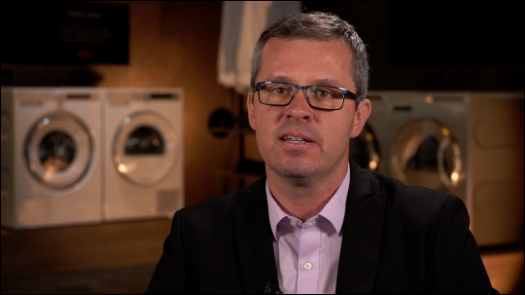
Denis Ostir, Director of Corporate Communications, Gorenje Group. (Photo: CGTN)
In one of the largest acquisitions in the Slovenian history, Chinese electronics giant Hisense bought the country's home appliances producer Gorenje for 340 million US dollars.
Just a few weeks ago, the European Commission confirmed that the acquisition was done in accordance with the EU regulations, what opened doors for Hisense significant breakthrough at the European market.
For seven decades, Gorenje has been manufacturing home appliances. It started as the biggest producer in the former Yugoslavia.
Today the firm is considered a significant player in the European home appliances market, with a 4 percent market share. Its annual turnover is around 1.5 billion US dollars.
But beneath this seemingly rosy picture, the management could see the company was heading for a dead end. That’s why they decided to contact Chinese partners and ask them to bail the company out from a potentially disastrous situation. As Denis Ostir, Gorenje’s Director of Corporate Communications told CGTN it was a sound minded decision.
“Companies of our size have either gone bankrupt or they’ve become a part of a larger group. So it was pretty clear that we need to find a strategic partner and an owner who’s gonna be able to provide us with the quality backing we need. To grow with them in a sustainable way. So it was a decision we took. It wasn't a hostile takeover, it was one we encouraged, it was the path we knew we needed to pursue,” Ostir said.
Gorenje factories employ 11,0000 people in four Gorenje factories in Slovenia, Serbia, the Czech Republic and the Netherlands. Its management says all those jobs would be in jeopardy without this acquisition by Hisense.
Paving the way for the others
Gorenje is just one of the examples of growing China-Slovenia economic relations. Slovenian company Pipistrel with its Chinese partner is opening two electric aircraft factories in China.
Another Slovenian company Arctur installed Europe's first Chinese-made supercomputer, while China bought Slovenia's second largest airport, Maribor International, as well as the TAM trucks company.
Slovenia is part of the Belt and Road initiative, and as such has great potential for infrastructure developments. The country's geostrategic position provides significant perspectives for investments in sea, land and air traffic infrastructure, the areas of interest for China.
But according to Sašo Stanovnik economic analyst, from Alta Invest, not everybody is happy with that possibility.
“There are sometimes signals from the West that maybe we should rely more on Western investors. However, I’d say that the climate in Slovenia is not biased towards certain investors. We could say maybe, because of history, we are more easily persuaded to take Russian or Chinese investments than let’s say from the US,” Stanovnik said, those investments are most likely not going to happen yet, but there is a lot of other options and projects on the table. The Gorenje example shows how those can be materialized.


